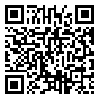Abstract
Introduction:ĀThe present study is designed to determine the role of meaning assignment structures/ schema, transient emotional states, and their interaction in the recall memory of emo- tional words, as well as testing the content specificity hypothesis.
Method: 150 subjects as 5 groups of 30 individuals were selected according to wether they had clinical or subclinical axiety-depression and non-adaptive schema. After inducing 4 different emotions, the recall memory of participants were assessed by repeat measurements of 4 different categories of self-referred emotional words.
Results: The study revealed the effect of the experimental group and emotional induction on recall memory of emotional words, and also the augmenting effect of the emotional state together with the experimental group on the memory bias. ┬Ā
Conclusion: The results support that both schema and the emotional situation can bias the me- mory. These findings are consistent with both meaning assignment structures/schema theory, and associative network theory. Although it did not prove the content specificity hypothesis, there is some evidence of memory bias in normal individuals without non-adaptive schema.
Received: 2007/02/19 | Published: 2005/11/15
| Rights and permissions | |
 |
This work is licensed under a Creative Commons Attribution-NonCommercial 4.0 International License. |


